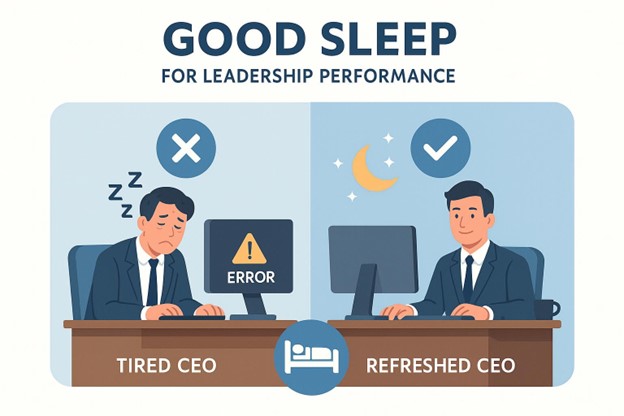Why CEOs and Entrepreneurs Should Focus on Sleep Tracking

In the fast-paced life of startups and business leadership, being tired all the time is often seen as something to be proud of. Many believe that to succeed, you have to give up something — and sleep is usually what goes first.
But what if this mindset actually hurts your ability to perform your best? What if the real secret to sharper thinking, better creativity, and long-lasting leadership is not less sleep, but better sleep?
This is where tracking your sleep steps in. It turns sleep from something passive into a useful, data-based tool for better results. And if you want to start improving how you relax before bed, exploring the best sounds for sleep can be a helpful beginning.
Today, more CEOs are proudly making sleep a priority and motivating their employees to do the same. They see that in today’s challenging business world, sleep isn’t just nice to have — it’s a real advantage.
Why Sleep Tracking Is Important for CEOs and Entrepreneurs
Simply put, sleep tracking means keeping track of how you sleep over time. Instead of just guessing based on how you feel, you get actual data, such as how many hours you sleep, how often you wake up, and important details like heart rate and breathing patterns.
It’s about finding real ways to sleep better, which affects your health and performance.
Being a CEO or an entrepreneur is demanding. You deal with constant pressure, tough choices, and long hours. Good leadership needs you to be sharp, patient, and full of energy — all of which come from getting enough quality sleep.
Most of us need about 7-9 hours of sleep a night.
Believing that less sleep equals more success is not only wrong, but it can actually hurt you. Only a small number of people can do well with very little sleep.
How Lack of Sleep Hurts Performance in Leadership
Your brain is like the control center of a company, and its executive parts are deeply affected by not sleeping enough. Studies show that when you’re sleep deprived, your ability to make quick and accurate decisions, solve problems, and come up with new ideas drops noticeably.
A lack of sleep affects focus, memory, and clear thinking.
Also, not sleeping enough can make you act on impulse and take more risks — even financial ones. It’s harder to manage your emotions, making you more likely to react instead of thinking things through.
Bad sleep is common in many workplaces, and it costs companies a lot of money. Data shows that lost sleep leads to lost productivity, more mistakes, and slow decision-making.
Health Risks and Burnout
Not sleeping enough for a long time is bad for your health. It increases your chances of getting heart disease, stroke, diabetes, high blood pressure, and weight problems.
Your immune system also weakens, so you get sick more easily. When you’re ill, you can’t lead your business as well.
The constant stress of being a business leader, combined with poor sleep, can quickly lead to burnout. Stress raises your cortisol, which makes falling and staying asleep even harder, trapping you in a bad cycle.
Making sure you rest well stops burnout and helps you and your team keep working well in the long run.
Simple Ways for CEOs and Entrepreneurs to Track Sleep
Balancing leadership and personal well-being starts with quality sleep. There are plenty of sleep tracking tools out there, from basic smartphone apps to advanced gadgets you can wear.
As a busy leader, pick one that’s easy, reliable, and gives you the information you need without making things harder.
Here are practical ways CEOs and entrepreneurs can track their sleep and improve their rest:
- Use Wearable Sleep Trackers – Devices like smartwatches and fitness bands can monitor sleep patterns, heart rate, and movement, providing insights into sleep quality.
- Sleep Apps – Smartphone applications analyze sleep cycles using sound and movement data. They offer smart alarms to wake users at optimal times, preventing grogginess.
- Smart Mattresses and Pillows – Advanced bedding technology tracks sleep metrics like pressure, movement, and temperature to personalize comfort settings.
- Manual Sleep Journals – Logging bedtime habits, caffeine intake, and wake-up times can help identify patterns and make improvements.
- Set Sleep Goals – Many tracking tools allow users to set sleep goals, ensuring better consistency in bedtime routines and overall well-being.
- Optimize Environment – Tracking external factors like room temperature, light exposure, and noise levels can enhance sleep quality and effectiveness.
Decide what you care about most: Do you want to know all about your sleep cycles, or just need the basics like hours and wake-ups? Do you prefer something you wear or something on your bedside table?
Many CEOs use a mix of apps and wearables to get a full picture. The best tool is whichever you’ll use regularly.
By incorporating sleep-tracking methods into daily routines, CEOs and entrepreneurs can fine-tune their sleep habits, boost productivity, and sustain long-term success.





